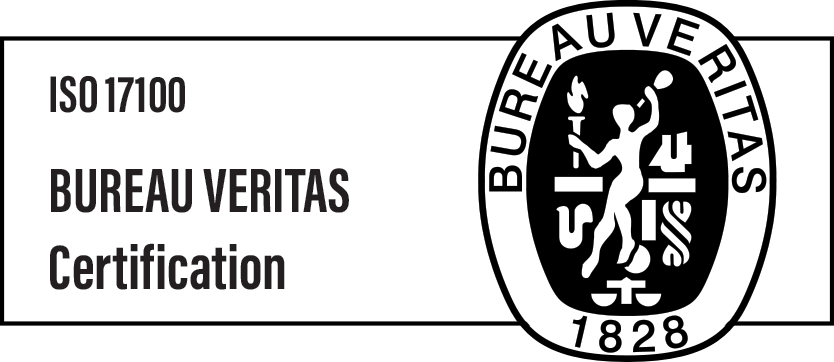Services provided by translation agencies are often associated just with the final result of the whole process – a translated text. These connotations are not wrong, but they lack a few elements. You see, the scope of a professional translation agency’s work is much broader. Such agencies are frequently referred to as LSPs – language service providers. They cover diverse activities related not only to translation but also to numerous other linguistic aspects. Let’s take a closer look at them.
In this article, we will answer several valid questions: Who works in the translation agency? What professions can you find there? Do only translators work with translations? Let’s find out more about occupations in the translation business!
Translators
Undoubtedly, translators receive a vast majority of attention when thinking about translation agencies. And that’s reasonable, as they play the main role in the process of transforming the source text into the target one. They work with documents of any nature. Translators are prepared to deal with everyday texts, articles, certificates and business documents. What’s more, they frequently specialise in one particular area, for instance, medical translation. However, certified translators are required when it comes to legal translation. These are specialised translators who completed a state examination authorising them to work with this kind of documentation.
A separate service that needs emphasising is related to technical translation. Technical texts are complex and require broad industry knowledge and attention to detail. If you want to translate technical texts, you need to dive into the manufacturing industry and get acquainted with used terms and acronyms (this sector is full of them). At Aploq, we cooperate with technical translators who have experience in a whole range of manufacturing-related sectors and niches.
Interpreters
This profession is often mistakenly referred to as translators. The difference is quite significant: while translators work with written texts, interpreters are responsible exclusively for oral translation. We can distinguish three main types of translation that interpreters work with: a-vista, which is an immediate oral translation of a written text, simultaneous (in real time) and consecutive, which happens mostly during meetings, conferences or events. In this type, the interpreter is translating the words of the speaker in chunks. That is why the work of interpreters demands fast reactions and high resilience to distractions.
Editors
After the translation is complete, the editor’s duties mainly include scanning the final effect in terms of wording, register and general compatibility with the source text. Editors work with both versions, comparing the original text with the target text. The editor’s job is usually described as the big picture, unlike a proofreader’s work (who has the final say in the translation process!). To sum up, editors are responsible for ensuring that the translation has the same meaning as the source text.
Typesetters
The translation is mainly focused on the text and its meaning. However, this is not the end of the process. When the text is being transformed into another language, it also needs to be localised. What does this mean? In short, the format and layout of the translation should follow every single standard of the target language. Typesetters take care of that. Their job is to prepare the text in such a way that it fulfils the demands of the target audience. These may include linguistic aspects, such as punctuation, or more stylistic issues – font, text direction or its expansion on the page. The most important goal that typesetters desire to achieve is to create a text that will be fully familiar to native speakers of the target language.
Proofreaders
Proofreaders occupy the last stage of the translation process. Proofreaders very often do not have access to the original document, but it doesn’t seem to be important; they are the ones who imitate the target audience. Their task is to get into the role of the native speaker of a particular language and investigate the outcome of the translation. Even though proofreaders do not work with the source text, they often compare the last version of translation with the editor’s work to check if all the changes were adequately introduced. Their job is then referred to as ‘a magnifying glass’. Proofreader’s duties are frequently underestimated, but they require a lot of linguistic and intrapersonal skills. Proofreaders need to be fluent in the target language and have the knowledge of grammar, punctuation and spelling; concentration, time-management, organisation and mental stamina are also crucial in this profession.
So far, we’ve covered the specialists who work directly with the text. Who else works in the translation agency?
Other specialists in translation agencies
Here, we have to mention four more professions that are more and more common in LSP companies:
- Graphic designers – they are responsible for creating graphic content either from the beginning or from a template suggested in the original document.
- Testers – these experts may be compared to proofreaders of the interface. Testers are necessary, especially when the software is being translated. Their task is to make sure that everything looks correct from the user’s perspective.
- Localisation engineers – localising is a crucial part of every translation. Engineers specialised in this area can use their skills to manage translation tools (such as Trados) and provide more technical and professional knowledge in terms of converting numbers, changing currencies, measurements, etc.
- Project managers – they cooperate directly with the clients who delegate the project to the translation agency. After receiving the assignment, they prepare all the necessary materials and resources to accomplish the task. Their responsibility is to make sure that the final result will be satisfying. That is why project managers often choose very carefully who can be in charge of the project.
As you can see, the list of professions necessary in translation agencies does not end with translators. If you want to see how all that works in practice – we invite you to reach out. If you are a client looking for comprehensive translation services – send this form to us. And if you want to work with us, this section is just for you!
Suggested read:


